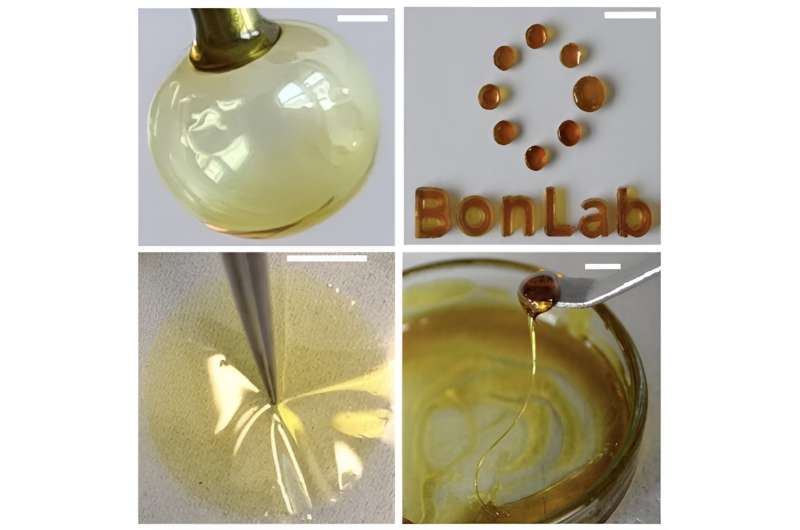This article has been reviewed according to Science X's editorial process and policies. Editors have highlighted the following attributes while ensuring the content's credibility:
fact-checked
peer-reviewed publication
trusted source
proofread
Small molecule organic eutectics show potential for replacing plastics

Plastics have long been a mainstay in modern manufacturing, but their environmental impact has increased demand for eco-friendly alternatives. Researchers at The University of Warwick have made significant progress in the search for sustainable alternatives to conventional plastics.
In response to growing environmental concerns, the move towards a circular economy and changing consumer preferences, the research team has identified that certain mixtures of small organic molecules—materials created by mixing crystalline components—form interesting glasses and viscous liquids. These so-called organic eutectics are promising candidates for replacing polymers in various products.
The team successfully developed a series of hydrophobic eutectic molecular liquids and glasses, each carefully crafted by combining different crystalline components. Using advanced techniques such as differential scanning calorimetry (DSC) and UV-vis spectroscopy, the eutectic compositions were precisely determined. The analysis was refined using a trained partial least squares regression model, ensuring accuracy in identifying the optimal material blends.
One key challenge in creating sustainable plastic alternatives is ensuring long-term stability. The Warwick team addressed this by testing the amorphous materials over an extended period of up to 14 months, using powder X-ray diffraction (PXRD) to confirm their resistance to crystallization. This durability is crucial for ensuring that products maintain their integrity throughout their shelf life.
In addition to stability, the researchers investigated the processability of these materials by examining their rheological properties. They found that all the liquids exhibited low fragility indices, making them suitable for various manufacturing processes, including glassblowing, fiber pulling, film formation, and molding.
Importantly, the team demonstrated that the properties of these materials could be tailored to specific applications by blending different eutectic systems or incorporating plasticizers.
Prof. Dr. ir. Stefan Bon, lead investigator of the work, now published in Chemical Science, says, "The original plan was to develop an anything-but-plastic concept material for the formulation industry.
"Dr. Joshua Ryan, a talented former Ph.D. researcher in my team, BonLab, undertook a systematic study of blending small hydrophobic organic molecules that could undergo a variety of non-covalent interactions with one another. That these hydrophobic eutectic systems had such remarkable physical properties was beyond our initial expectations.
"We brought our colleague Prof. Gabriele Sosso on board to study by computer simulations how these eutectic mixtures interacted on a molecular level. These small molecule organic eutectic systems offer an opportunity to further develop high-performance materials that can replace conventional polymers in various applications.
"In a way, they can be seen as a non-covalent analog to dynamic reversible macromolecular covalent materials, known as vitrimers."
To showcase the practical potential of these materials, the researchers conducted a controlled release study using a eutectic system composed of 4-hydroxychalcone and bifonazole as a matrix. This study serves as a proof of concept, highlighting the versatility of eutectic materials in applications such as drug delivery and beyond.
More information: Joshua L. Ryan et al, Small molecule organic eutectics as candidates to replace plastics, Chemical Science (2024). DOI: 10.1039/D4SC02574A
Journal information: Chemical Science
Provided by University of Warwick





















